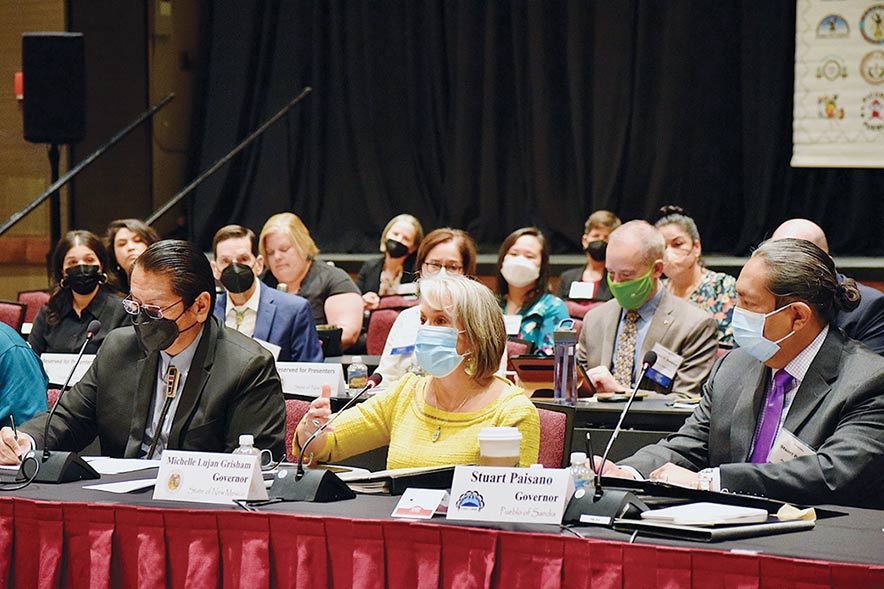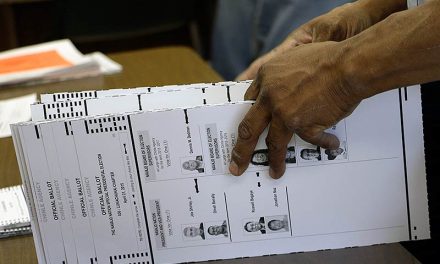
Governor touts record at Tribal Leadership Summit

Special to the Times | Diane Joy Schmidt
President Jonathan Nez sits next to Gov. Michelle Lujan Grisham as she addressed the annual State-Tribal Leadership Summit on June 2 in Albuquerque.
By Diane Joy Schmidt
Special to the Times
ALBUQUERQUE
After two years of virtual meetings, the annual State-Tribal Leadership Summit took place in person this year at Sandia Casino, where a complete roster of New Mexico’s nations, tribes and Pueblos met with Gov. Michelle Lujan Grisham on June 2.
This summit began in 2009 under the State Tribal Collaboration Act to ensure that tribal priorities guide state-level policymaking and funding priorities.
At the top of the list was a high-level briefing on current conditions, future projections, and how the state and tribes are working together on water, the drought and wildfires.
Cultural education and the Missing and Murdered Indigenous Women and Relatives also were highlighted topics.
New media access to the event was restricted only to the governor’s opening remarks.
Indian Affairs Department Secretary Lynn Trujillo introduced Grisham who, in her opening remarks, listed accomplishments of her administration that included more funding for programs and services.
With her landmark increases in education funding, including free college tuition for all state and tribal colleges, Grisham acknowledged the assembled tribal leaders and said, “It is all occurring. Because this group took a stand on the domestic educational crisis that prior administrations were working to defund, this body’s leaders stood up and refused to allow that.”
Beyond college funding, the governor looks forward to the state achieving universal early childhood education and spoke about the new literacy programs in elementary schools.
These, she said, “are going to be a game changer by having the only formula within the country” that allows input into the curriculum from students and their families.
And “with more requirements that are productive, fair outcomes, including language, tradition, cultural heritage, than any other state,” she said.
New Mexico has implemented language access, to communicate with the Navajo people in their own language regarding important policy shifts, programs and making information available in health, education and in the courts. For example, how to handle domestic violence.
Grisham said New Mexico is leading the country in environmental work and standards, “So much so, that the federal government is now regulating methane.”
And, she said the state is working with each tribal nation on how they want to address cannabis policy.
The governor noted that the state has been able to get the fastest emergency declaration ever from the federal government, and to get the Forest Service to admit complete liability for the prescribed burn that started the biggest wildfire in the state’s history.
She pointed out that the tribes were not consulted about these burning practices, and said, “They didn’t use your expertise…they are consulting you now, but a little too late.”
Each tribal leader made a state of the nation address. First was Pueblo of Sandia Gov. Stuart Paisano, who said, “Although the resiliency of nations, tribes and Pueblos has been proven time and again, Native communities need a tremendous amount of support if we are to truly overcome the long-standing issues that our communities and people face.
“The Lujan Grisham administration has broken the cycle of historic neglect,” he said, “and with the 2022 summit, we are hitting the start button on numerous programs that will create opportunities for our people.”
President Jonathan Nez and Speaker Seth Damon both spoke.
Nez issued a statement ahead of the summit that said, “This annual summit is critical to strengthening the government-to-government relations between tribal nations and the state of New Mexico.”
Information: www.iad.state.nm.us.








 Highway 264,
Highway 264, I-40, WB @ Winslow
I-40, WB @ Winslow